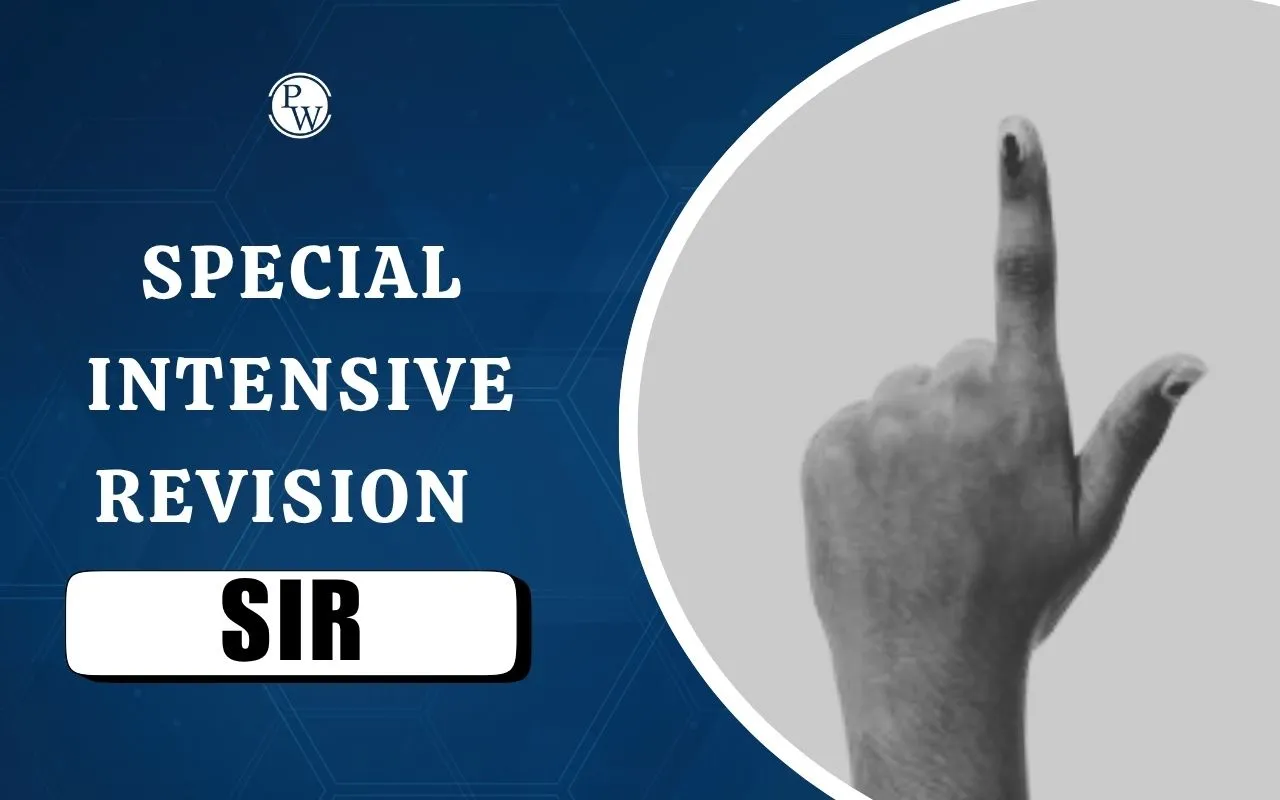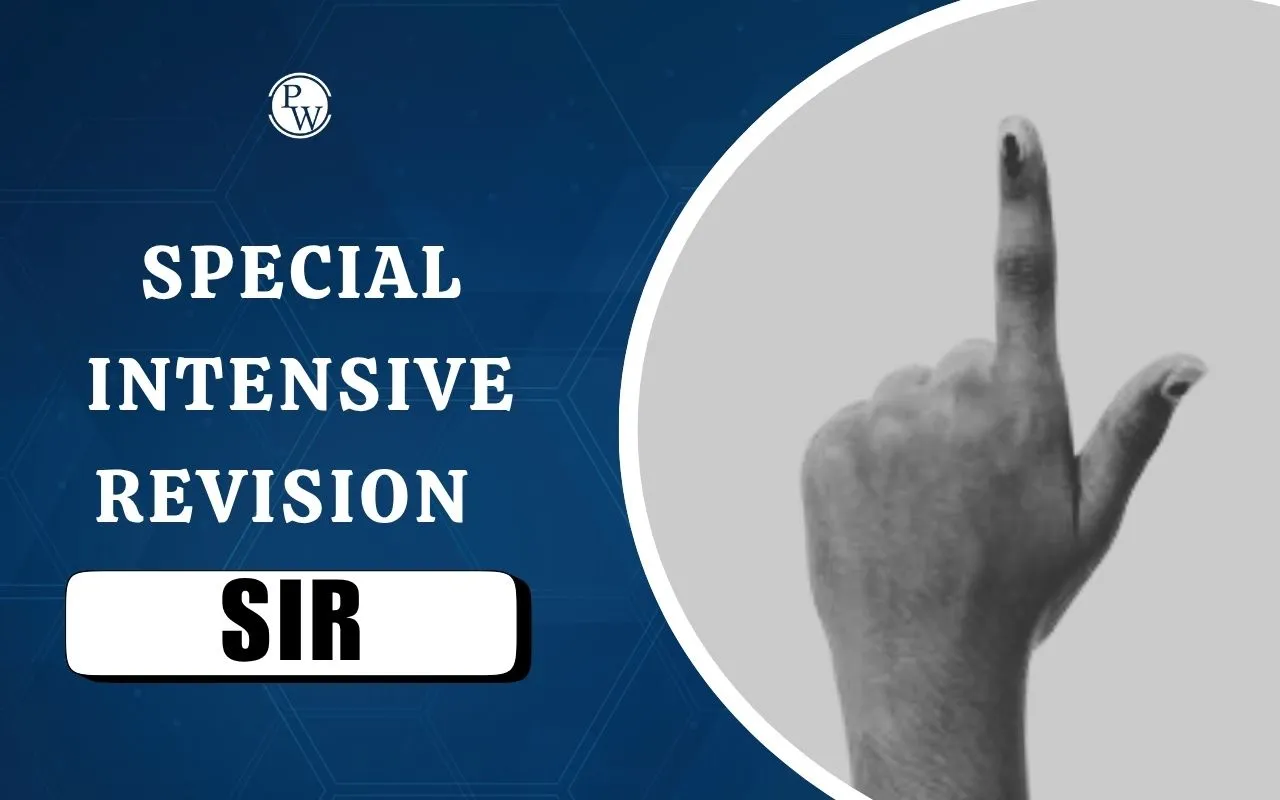

Special Intensive Revision (SIR): The Election Commission of India (ECI) has started a Special Intensive Revision (SIR) of electoral rolls. The revision will take place for 12 States and Union Territories, and it will cover around 51 crore voters. The revision will remove duplicate, migrated, and ineligible entries, which will ensure updated and accurate voter lists. It’s first nationwide revision of this kind since 2002–2005.
Special Intensive Revision (SIR) Basic Highlights
The Special Intensive Revision (SIR) aims to verify India’s voter rolls to ensure that only eligible citizens remain on the electoral lists. Here are quick highlights of SIR:
|
Special Intensive Revision (SIR) Key Facts |
|
|
Launched By |
Election Commission of India (ECI) |
|
Coverage |
12 States and Union Territories |
|
Total Electors Covered |
Around 51 crore voters |
|
Enumeration Period |
November 4 to December 4, 2025 |
|
Draft Roll Publication |
December 9, 2025 |
|
Final Roll Publication |
February 7, 2026 |
|
Excluded State |
Assam (due to NRC process) |
|
Legal Basis |
Article 326 of the Constitution and Representation of the People Act, 1950 |
|
Officials Involved |
Booth Level Officers (BLOs), Electoral Registration Officers (EROs), Assistant Electoral Registration Officers (AEROs), District Magistrates, Chief Electoral Officers |
What is Special Intensive Revision (SIR)?
The Special Intensive Revision (SIR) is a voter verification exercise by the Election Commission of India. It will ensure that only eligible Indian citizens aged 18 or above remain on the electoral rolls. It involves door-to-door verification by Booth Level Officers (BLOs) using Unique Enumeration Forms (EFs).
If an elector’s name appeared in the 2002–2004 SIR rolls, no additional documents are required. However, voters added after that must provide eligibility documents to confirm their citizenship and residence.
Why is SIR Needed?
The need for SIR arises due to increasing migration and outdated voter lists. Electoral rolls must be revised before every election or when required as per law. The last SIR took place over 21 years ago (2002–2004).
Also Political parties have raised concerns about incorrect and duplicate entries, deceased voters, and wrongful inclusion of non-citizens. Frequent migration, unremoved dead voters, and duplicate registrations have made revision essential to maintain the purity of electoral rolls and strengthen democracy.
Who Will Work in SIR by Election Commission?
The SIR is a large administrative exercise involving several key officials:
-
Booth Level Officer (BLO): One per polling station (around 1,000 electors each)
-
Electoral Registration Officer (ERO): Sub-Divisional Magistrate (SDM) level officer who prepares, verifies, and finalizes electoral rolls.
-
Assistant ERO (AERO): Assists EROs at the tehsil level.
-
District Magistrate (DM): Hears first appeals against ERO decisions.
-
Chief Electoral Officer (CEO): Hears second appeals at the state level.
How Will SIR Process Work?
The process is divided into various phases. These phases are:
Pre-Enumeration Phase:
This phase includes:
- Training of BLOs, EROs, and DEOs.
- Linking existing records with the 2002–2004 SIR database.
- Political parties’ Booth Level Agents (BLAs) trained to assist and verify up to 50 forms per day.
Enumeration Phase (Nov 4–Dec 4):
This phase includes:
- BLOs distribute Enumeration Forms (EFs) to every voter.
- BLOs make three visits to verify details.
- Electors can also submit forms online via the Voter Portal (https://voters.eci.gov.in).
- Identification of dead, duplicate, or migrated voters.
Post-Enumeration:
This phase includes:
- Draft rolls published on December 9, 2025.
- Claims and objections heard up to January 8, 2026.
- Final voter rolls published on February 7, 2026.
What are Documents Required (Indicative List) for SIR?
- Birth Certificate issued by competent authority
- Passport
- Matriculation/Educational Certificate
- Permanent Residence Certificate
- Government-issued ID (Central/State/PSU)
- Caste or OBC Certificate (where applicable)
- Family Register from local authorities
- NRC extract (where applicable)
- Land or house allotment certificate
- Aadhaar (for identity only, not citizenship proof)
- Extract from Bihar SIR Roll (2005 reference)
When SIR Process start?
Here is the list of dates when the SIR will start, conclude and more:
Enumeration Begins: November 4, 2025
Draft Roll Publication: December 9, 2025
Final Roll Publication: February 7, 2026
Where will SIR be held?
The Special Intensive Revision covers States such as Uttar Pradesh, Gujarat, Madhya Pradesh, Chhattisgarh, Rajasthan, Tamil Nadu, West Bengal, Kerala, Goa, Puducherry, Andaman & Nicobar Islands, Lakshadweep. However, Assam is excluded due to NRC and Citizenship Act provisions).
Way forward
The Special Intensive Revision (SIR) is one of India’s largest voter verification drives and it will ensure that every eligible citizen is included while outdated or duplicate entries are removed. Through this transparent, technology-enabled process, the Election Commission aims to strengthen electoral integrity and restore public trust in India’s democratic system.
